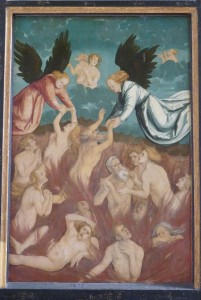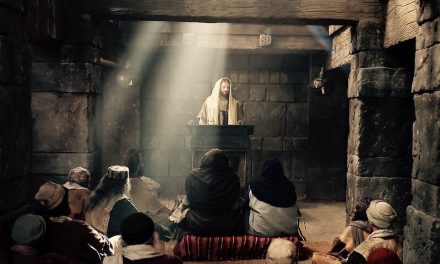2 Mc 7:1-2, 9-14
Ps 17:1, 5-6, 8, 15
2 Thes 2:16-3:5
Lk 20:27-38
 Our readings for this week are fitting for this month of the Holy Souls. In my conversations over the years with my husband, who is not Catholic, I have come to realize that the Catholic approach to the dead is distinctive from our Protestant brethren. Most Protestants do not pray for the dead since the practice lacks biblical foundations (2 Maccabees, where the biblical justification of such prayers for Catholics is found, is considered non-canonical by Protestants). Catholics not only expect the dead to pray for us; we also pray for the dead and do acts of charity to usher them more quickly into paradise. This month of Holy Souls is kicked off appropriately by All Saints, where we ask the dead who now experience Christ’s glory to pray and intercede for us, followed by All Souls. A number of indulgences are offered during this period for the poor souls in purgatory. For example, a partial indulgence can be obtained by devoutly visiting a cemetery and praying for the dead. Visiting a church on All Souls and saying one Our Father and the Creed grants a plenary indulgence. And any time the Requiem Aeternam is prayed, one can gain a partial indulgence for the poor souls in purgatory.
Our readings for this week are fitting for this month of the Holy Souls. In my conversations over the years with my husband, who is not Catholic, I have come to realize that the Catholic approach to the dead is distinctive from our Protestant brethren. Most Protestants do not pray for the dead since the practice lacks biblical foundations (2 Maccabees, where the biblical justification of such prayers for Catholics is found, is considered non-canonical by Protestants). Catholics not only expect the dead to pray for us; we also pray for the dead and do acts of charity to usher them more quickly into paradise. This month of Holy Souls is kicked off appropriately by All Saints, where we ask the dead who now experience Christ’s glory to pray and intercede for us, followed by All Souls. A number of indulgences are offered during this period for the poor souls in purgatory. For example, a partial indulgence can be obtained by devoutly visiting a cemetery and praying for the dead. Visiting a church on All Souls and saying one Our Father and the Creed grants a plenary indulgence. And any time the Requiem Aeternam is prayed, one can gain a partial indulgence for the poor souls in purgatory.
You might be thinking at this point that all this stuff seems horribly antiquated. Such discussions of “poor souls in purgatory” and “plenary indulgences” also sounds a bit too un-ecumenical for the tastes of many, and I am not insensitive to those concerns. But prayers for the dead are some of the dearest traditions to me in the Catholic faith. It has long been my custom to light candles for my beloved dead, pray a rosary in a cemetery, or simply utter in my silent prayer “Eternal rest grant unto them, O Lord, and let perpetual light shine upon them. . . .” Our family prayers before meals always include “May the souls of the faithful departed, through the mercy of God, rest in peace.” Prayers for the dead are expressions of two things: hope in God and solidarity among the body of Christ.
Hope is a foundational theological virtue for Christians, one which is beautifully communicated in our first reading and in the gospel. Christians hope in the mercy of Christ through whom our mortal bodies will be raised in the resurrection. Hope allows us to do extraordinary things. It allows the brothers in our first reading from 2 Maccabees to suffer extraordinarily and regard their sufferings “as nothing” because of “the hope God gives of being raised up by him.” Jesus too directs his interlocutors to hope in the resurrection: “That the dead will rise even Moses made known in the passage about the bush, when he called out ‘Lord,’ the God of Abraham, the God of Isaac, and the God of Jacob; and he is not God of the dead, but of the living, for to him all are alive.”
When we pray for the dead, we are hoping for their eternal reward. Aquinas says that while hope is proper to one’s own good, we can indeed hope for another’s eternal life, “inasmuch as [one] is united to him by love” (II-II, Q. 17, art. 3). Thus, we cannot separate hope from the idea of solidarity in the body of Christ. Believers are united to one another through the bond of love which makes such prayers important acts of charity. We are not isolated individuals in the life of grace but are members of a supernatural society which allows us to cooperate with one another in that same life of grace. Asking another to pray for you, as Paul (or whoever the author is) does in our reading from 2 Thessalonians is a recognition of the solidarity that we share in the body of Christ. And we believe Paul’s prayer in that same reading for us is efficacious by virtue of that same solidarity: “May our Lord Jesus Christ himself and God our Father, who has loved us and given us everlasting encouragement and good hope through his grace, encourage your hearts and strengthen them in every good deed and word.”
For Catholics, this “everlasting encouragement” Paul refers to extends beyond even death as we offer prayers, supplications, and sacrifices for our beloved who may not yet share in the glory that awaits them. But because we continue to hope in their glory and share in the same body in the communion of saints, we do not fail to continue “in every good deed and word” to bring them ever quicker to the fulfillment of our hope.
Eternal rest grant to them, O Lord, and let perpetual light shine upon them. May the souls of the faithful departed, through the mercy of God, rest in peace. Amen.



